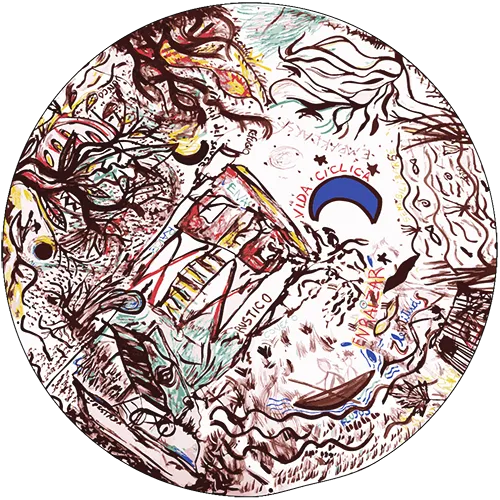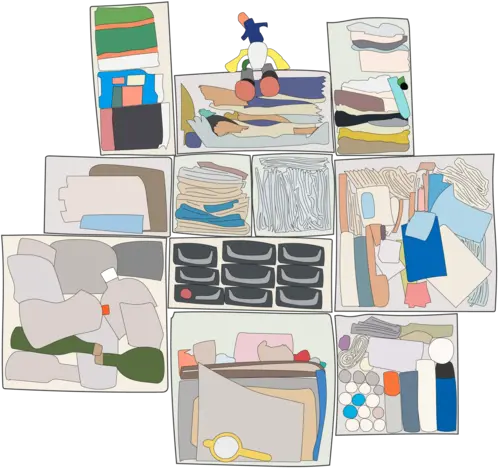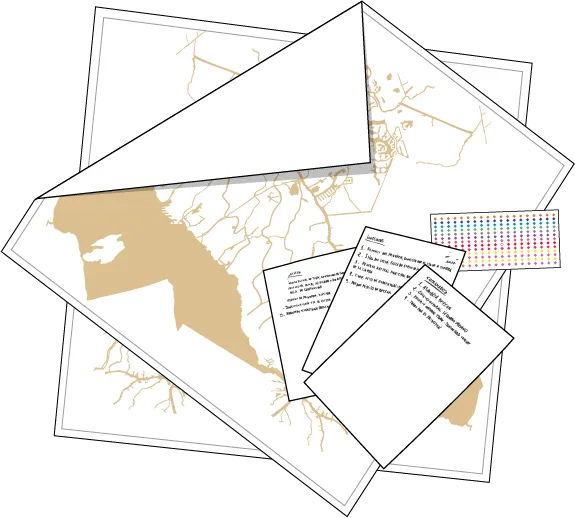Reimagining the Wetlands
Harnessing the Power of the Arts for Socio-Ecological Transformation
This project seeks to harness the potential of the arts for socio-ecological transformation by fostering knowledge-exchange between academic and non-academic partners. The territory of the Delta de Tigre (Argentina) is an inhabited network of rivers and streams afflicted by socio-ecological problems and conflict (i.e., waste, climate change, gentrification, pollution, and real estate mega-enterprises). These problems and conflicts affect human interaction with the ecosystem and the functioning of the wetland. Over the years, human-non-human living conditions have degraded.
The project focuses on supporting local stakeholders addressing these challenges through knowledge-exchange activities (i.e., creative workshops) that value and harness the knowledge and imagination already existing in the community for pursuing a more sustainable future for the Wetlands. It combines ethnographically inspired research, arts-based participatory approaches, and political ecology studies to uncover how community-led knowledge creation for socio-ecological transformation happens.
The project is a collaboration between the University of Leeds, the University of Buenos Aires, Gino Germani Research Institute ‒ IIGG, Centro Cultural Casa Puente (Tigre) and La Residuoetca (Tigre)
Re-Imaging the Wetlands is funded by the University of Leeds’ Global Impact Acceleration Awards (GIAA) and the School of Sociology and Social Policy



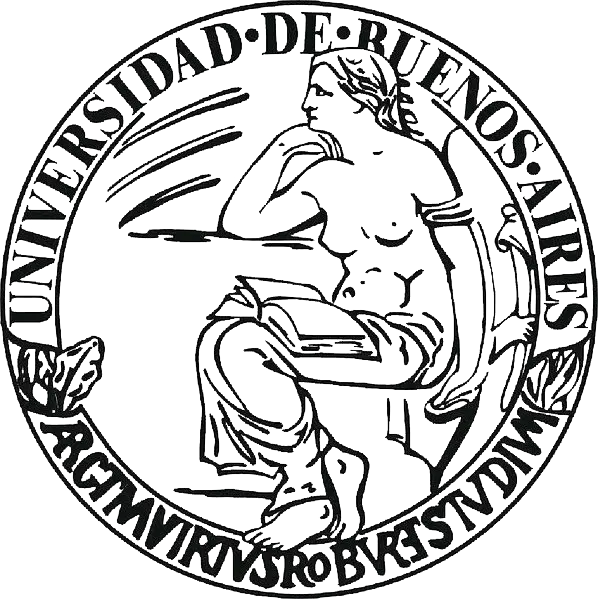

Objectives
1.
To carry out social and community mapping in the territory of the Delta de Tigre to expand knowledge, recognize and record different personal narratives, imaginaries, and experiences about inhabiting the wetland.
2.
To co-create with non-academic partners three participatory workshops involving the local community at the Tigre Wetlands.
3.
To document and evidence the process and impact of community-led knowledge creation for socio-ecological regeneration.
4.
To develop a tool-kit for arts and socio-ecological transformation.
Workshops
Team

Dr Maria Rovisco
University of Leeds
She is Associate Professor of Sociology at the University of Leeds, United Kingdom. She holds a PhD in Sociology from the University of York, a Master’s degree in Communication, Cultures and Information Technologies from ISCTE (Instituto Superior de Ciencias del Trabajo y de la Empresa), University of Lisboa, and a Bachelor’s degree in Sociology from University of Coimbra. Her interests focus on civil society, the public sphere, socio-ecological transformation, cosmopolitanism and art. She is the author of Artists, Cosmopolitanism, and the Civic Imagination” and the co-editor of Visual Politics in the Global South.

Dr Lorena Verzero
University of Buenos Aires – CONICET
She is an Independent Researcher at CONICET (Consejo Nacional de Investigaciones Científicas y Técnicas), Argentina, and Professor at UBA (University of Buenos Aires), Argentina. She holds a PhD in History and Theory of Arts from UBA; a Master’s degree in Humanities from University Carlos III de Madrid, and a Bachelor’s and Teaching degree in Literature from UBA. She is Director of the Graduate Program in Contemporary Artistic Practices and Politics in Latin America, Faculty of Philosophy and Letters, UBA and Coordinator of the Study Group on contemporary Theater, politics and society in Latin America, Gino Germani Research Institute, Faculty of Social Sciences, UBA. She specializes in the relationships between performance practices, politics, and society in the recent history of Latin America. She is the author of “Teatro militante: Radicalización artística y política en los años 70“. Among other books, she has edited: “Ciudades performativas: Prácticas artísticas y políticas de (des)memoria en Buenos Aires, Berlín y Madrid“, “Mutis por el foro. Artes escénicas y política en tiempos de pandemia“, “Perspectivas políticas de la escena latinoamericana. Diálogos en tiempo presente“
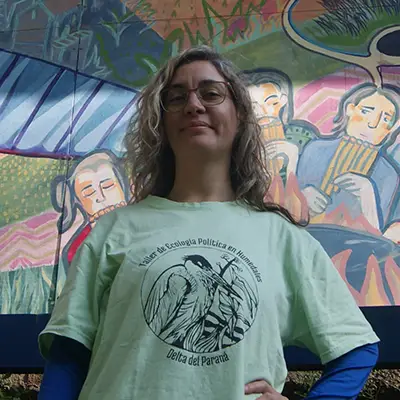
Dr Sofía Astelarra
University of Buenos Aires – CONICET
She has been living in the Tigre Delta for fifteen years. She is Assistant Researcher at CONICET (Consejo Nacional de Investigaciones Científicas y Técnicas), Argentina. She holds a PhD in Social Sciences from University de Buenos Aires (UBA), and a Bachelor’s and Teaching degree in Sociology from the same university. She completed a Post-doctorate at Instituto de la Ciencia y la Tecnología Ambiental at Universidad Autónoma de Barcelona, Spain. She specializes in socio-environmental conflicts in wetlands. Among other texts, she has published on this topic: “La memoria del agua: el agua es río y el río es memoria” and “¿Por qué mueren los peces? Cronologías del fracaso del saneamiento del río Reconquista. Itinerarios políticos en la defensa del agua y el humedal deltáico”.

Juan delGado
Interdisciplinary artist
He lives in London. His work spans various artistic media and on-site installation, focusing on themes such as trauma, landscape, disability, forced displacement and gender. His works are inspired by participatory artistic practices, exploring narratives of mobility and territory, often based on personal experiences and influenced by cultural anthropology. His most recent project is the trilogy “Drifting Narratives” In it, he reflects on the experiences of uprooting and exile of queer writer Khaled Alesmael. His work has received support from organizations such as the British Council and the Arts Council England, and has participated in exhibitions such as Jerwood Open Forest, Clandestino Festival (Sweden) and different International Biennials in Turkey, Argentina and International Media Arts Festivals.
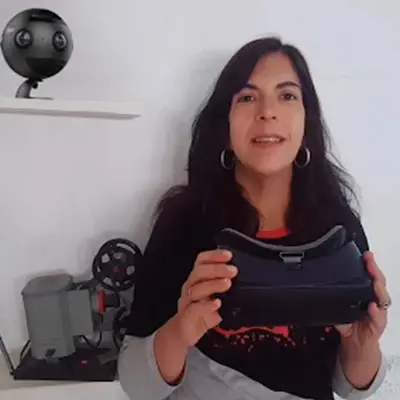
Laura del Árbol
Multimedia Artist – Audiovisual Designer
She holds a Master’s degree in Communication Design, Faculty of Architecture, Design and Urbanism (FADU), University of Buenos Aires (UBA) and is a Specialist in Higher Education Teaching, FADU, UBA. She is an audiovisual artist, oriented towards immersive video. She was Director of the research project “La didáctica del vídeo inmersivo en la universidad. Exploración y planteo de posibles dispositivos pedagógicos para la enseñanza de esta nueva narrativa”, FADU, UBA. She is Professor at FADU, UBA; Coordinator of the Audiovisual Area of the Bachelor’s Degree in Graphic Design at Universidad de Flores (UFLO) and teacher of Audiovisual Production and Post-production at Instituto Sudamericano de Comunicación (ISEC). She participates in this project as facilitator of the Ronda workshop, and in the design and production of all audiovisual and multimedia pieces for the website.
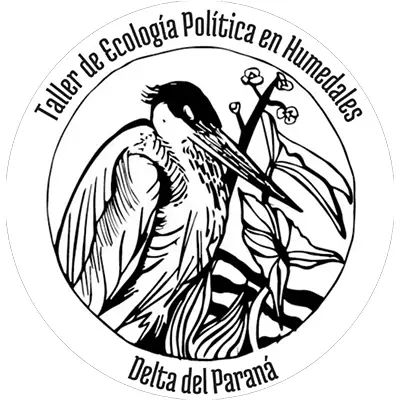
Colectivo Ecología Política en humedales
We are a collective formed by people who live permanently in the First Section of the Paraná River Delta islands, Tigre district, province of Buenos Aires, Argentina. We have named ourselves “Political Ecology Workshop in Wetlands.” We began meeting in 2022 at Casa Puente, a cultural and community center in the Tigre Delta. This space is part of the socio-community fabric and network that we inhabit.
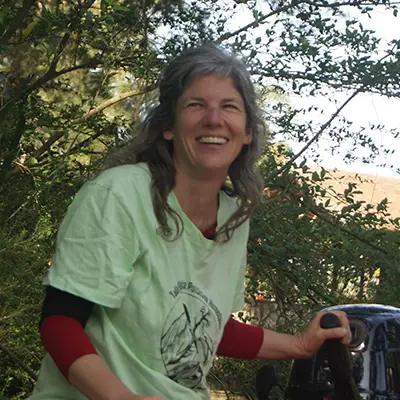
Ana Mossini
She has been living permanently in the Tigre Delta for six years, although she has been traveling through and inhabiting it for fifteen years. She is part of the Colectivo Ecología política en Humedales. She holds a Bachelor’s degree in Social Work (UBA), specializing in Health and Community Health. She has participated and continues to participate in community projects and organizations, and since living in the Delta, these are mainly subscribed to island organizations. She identifies as feminist, environmentalist, plant lover and fan of any narrative that is beautiful to tell and listen to.
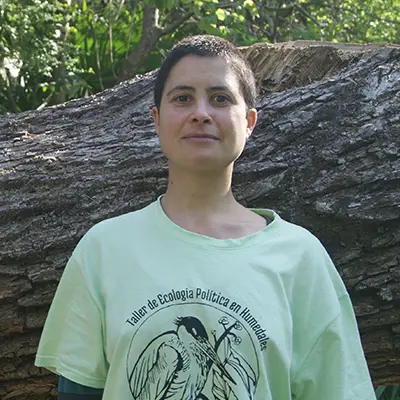
Ana Victoria Pérez
She has been living in the Tigre Delta for nine years. She has been part of the Colectivo Ecología política en Humedales since its beginnings, where she trains as a socio-environmental artivist. As a Butoh Dance dancer and Bachelor’s degree in Choreographic Composition of Corporal Expression from Universidad Nacional de las Artes (UNA), Argentina, she is part of artistic projects linked to socio-environmental issues. She is a Professor of Art from Universidad Católica Argentina (UCA), and works as a teacher of Language and Literature in the field of popular education, where she trains autodidactically and collectively. Through transfeminism, she has participated in various workshops and training sessions, as well as in collective projects and actions in different territories. She is also a mud house bio-constructor in the first section of Islands. She is part of the Reading Club of Casa Puente, cultural and community center of her neighborhood.
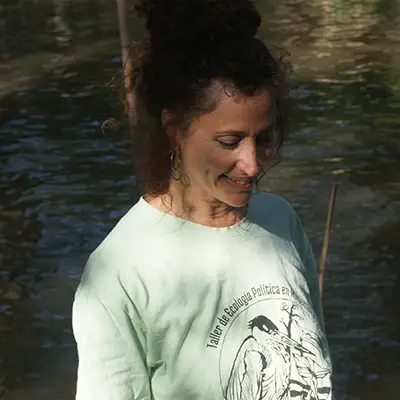
Erica Schejtman
She has been living in the Tigre Delta for some years. She is part of the Colectivo Ecología política en Humedales. She is a Chemical Technician and Gardening Technician from University of Buenos Aires (UBA), Argentina. She worked as assistant to the General Botany Chair at the Faculty of Agronomy of UBA. She worked in garden design and maintenance tasks. She participated for some years in a university volunteer project teaching workshops on ornamental plants, agroecological gardens and composting in prisons with the objective of favoring social and labor reintegration in Penitentiary Unit No. 47 and 48 of San Martín. She collaborated in neighborhood community gardens. Currently works in urban forestry in Buenos Aires and makes gardens with children at the Maternal and Infant Garden of INTI (Instituto Nacional de Tecnología Industrial). She is studying the Technical Degree in Popular Music at Facultad de las Artes of Universidad Nacional de La Plata in the former Esma.
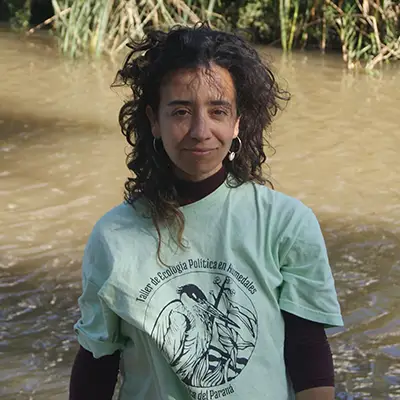
Gisel Denise Cáceres
She has been living in the Delta islands for twelve years. She works in different artistic disciplines (writing, photography, music, audiovisual and performance). She is a dancer, co-creator of the project “Cuerpo Territorio Performático“, a work of photographs and exhibitions. Co-creator of the event “Warmi Fest“, artistic gathering of women and dissidents from the islands and surroundings. Manager and active participant of the Centro Cultural y Comunitario Casa Puente (Islas del Delta del Paraná). Generator of short films and video poems. Her audiovisual art dialogues directly with the territory that surrounds her, experienced through this medium. She is part of the Colectivo Ecología política en Humedales.
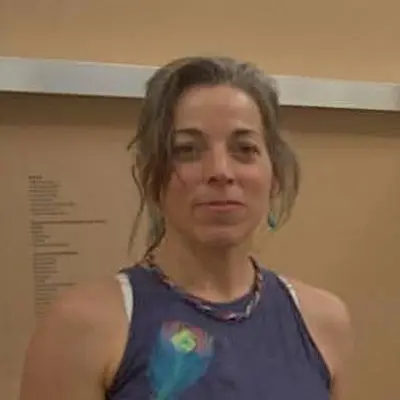
Guadalupe Boado
She has been living in the Tigre Delta for twenty years, attracted by the dialogue between natural rhythms and urban tensions. She holds a Bachelor’s degree in Environmental Management (Universidad Blas Pascal), has worked in multiple areas of the public and private sector, weaving bridges between territory, knowledge and action. Since 2005 she has been promoting “La Residuoteca”, a project that interweaves management, education and research around waste. Her environmental perspective is crossed by the arts, especially in their corporal and plastic forms, which nourish and traverse her practice.
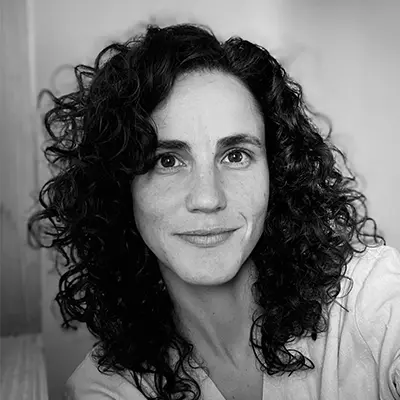
Inés Mengido
Entrepreneur, consultant and promoter of transformative projects
She is an Industrial Designer from University de Buenos Aires (UBA), Argentina, and Specialist in packaging and sustainable industrial design from Instituto Argentino del Envase, passionate about wild nature, art as a healing tool and regenerative human design. Currently works as Executive Designer at “La Residuoteca”, promoting the expansion of its innovative method, originated in the wetlands of the Tigre Delta, which promotes more conscious and sustainable waste self-management.
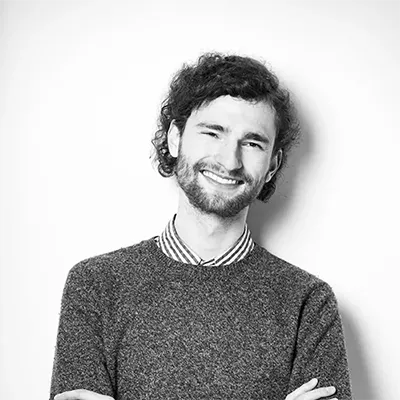
Pablo Espinosa
Digital humanities researcher and designer
Designer and digital humanities researcher focused on projects that promote inclusivity and social impact. He holds a master’s degree in Digital Culture and Society from King’s College London. His research and artistic practice in the digital humanities examines the materiality of technology in its interfaces and infrastructures, the ethical challenges and opportunities they present, and the creative potential of AI for the development of new directions in visual media.
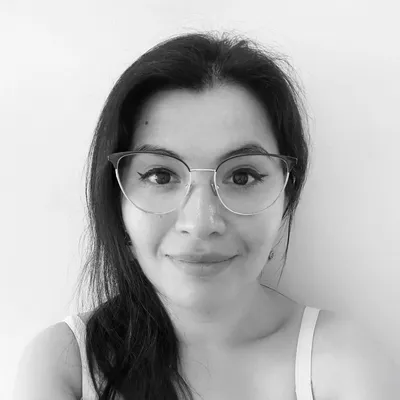
Dr Victoria Vargas-Downing
University of Leeds
She is a transdisciplinary researcher and holds a PhD in Cultural Studies from the University of Leeds. She is interested in the relationship between contemporary art and heritage from decolonial and feminist perspectives. She explores issues such as artivism, language, epistemic justice and environmental humanities. Over the last year she has worked on a series of interdisciplinary projects, such as Re-imagining the Wetlands, in Tigre Argentina, Virtual Museum of Water@Leeds, Moving Mountains AHRC Fellowship and Artivist Crossing Universidad de Buenos Aires and University of Leeds.
